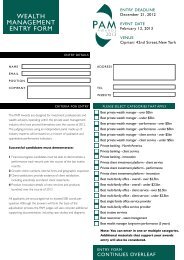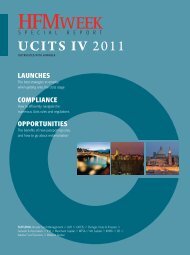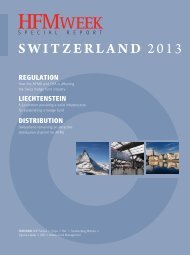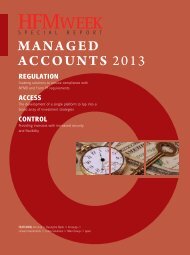CAYMAN 2012 - HFMWeek
CAYMAN 2012 - HFMWeek
CAYMAN 2012 - HFMWeek
- No tags were found...
Create successful ePaper yourself
Turn your PDF publications into a flip-book with our unique Google optimized e-Paper software.
ADVISORY<br />
are unacceptable to them to perform<br />
their role. Other directors may accept<br />
more limitations, but they make sure<br />
the manager understands this means<br />
they will have a reduced responsibility<br />
in terms of oversight.<br />
The way to overcome limitations is<br />
for the directors to get a really good<br />
handle on what the delegation documents<br />
say at the start, and put their<br />
hands up when they see something<br />
they don’t like.<br />
The better directors are certainly getting<br />
to the point where they are refusing<br />
to allow some of these limitations<br />
to be placed on them at launch, they’re<br />
insisting on their checklist of oversights<br />
and things they want to be able to deal<br />
with, or they’re just not willing to come<br />
onboard.<br />
you a degree of oversight, an alternative view to that of the<br />
investment manager and perhaps some insight into the industry,<br />
and these are all benefits.<br />
Many managers really only have exposure to the hedge<br />
fund industry, and hedge funds generally, through a couple<br />
of their own funds. There are obviously some larger managers<br />
for whom that’s not true, but many of them don’t.<br />
Obviously, professional independent directors have exposure<br />
to a lot more of it, so they’re usually better placed to<br />
advise on who knows what they’re doing and who doesn’t,<br />
but also on what the industry norms are.<br />
Managers often don’t know what the norm is and something<br />
that a manager is doing that a fund wouldn’t necessarily<br />
want to happen should be noticed quicker by an independent<br />
director.<br />
HFM: What limits are there on the role of an independent<br />
director and how can these shortfalls be overcome<br />
ID: You could say there really are no limitations. The director<br />
is, according to standard basic company law, responsible<br />
for the running of the company, so there shouldn’t be<br />
any limits on what they can do other than what is set out<br />
in the law and in the standard constitutional documents<br />
of the company, but of course that’s not true because they<br />
tend to delegate a lot of functions. What happens in reality<br />
is the limitations are set by the manager at the start.<br />
Some directors will come in at the beginning and inform<br />
the manager that limitations such as not having access<br />
to detailed management accounts or certain people<br />
HFM: How powerful are independent<br />
directors in reality given that<br />
investment managers have the power<br />
to vote for their removal<br />
ID: Obviously, the directors can ultimately<br />
end up powerless because they<br />
can be removed. I have even seen more<br />
recently, although it’s still very uncommon,<br />
cases where the ability to remove<br />
the directors remains with the investors,<br />
but it’s still quite uncommon and I’ve<br />
only seen it in circumstances where a seed investor has demanded<br />
it from the start.<br />
Of course, if a manager decides to take that nuclear option<br />
and remove a director, a lot of questions will be asked.<br />
The likelihood is that the director would have been going<br />
through a process of talking to service providers, and<br />
probably investors, expressing some dissatisfaction with<br />
what the manager has been doing. So to some degree, by<br />
the time you get to that point, the cat’s probably out of the<br />
bag already and a lot of the service providers are aware<br />
there’s something funny going on. Therefore, independent<br />
directors still retain a lot of power, even if it’s only by reputation,<br />
because of the noise they are able to make.<br />
In past years there may have been a concern that professional<br />
independent directors were afraid to rock the boat<br />
because it was their livelihood, and if they kept doing that<br />
they’d find nobody wants to work with them.<br />
In fact, as directors have been entering the mainstream<br />
more and more, I think the opposite has been the case. Directors<br />
who have jumped up and down and made noise<br />
about particular issues or the behaviour of certain managers<br />
find themselves very attractive to other funds who feel<br />
these directors protect investors’ interests. This is what<br />
gives them some power.<br />
It would probably be better if there wasn’t this appearance<br />
that they can just be removed at will, but the reality<br />
of the situation is that the ability to remove them is such a<br />
drastic option for a manger to take, looks so bad from an investor’s<br />
perspective and would require such degree of explanation,<br />
that very few managers will actually jump to that. n<br />
HFMWEEK.COM 37











